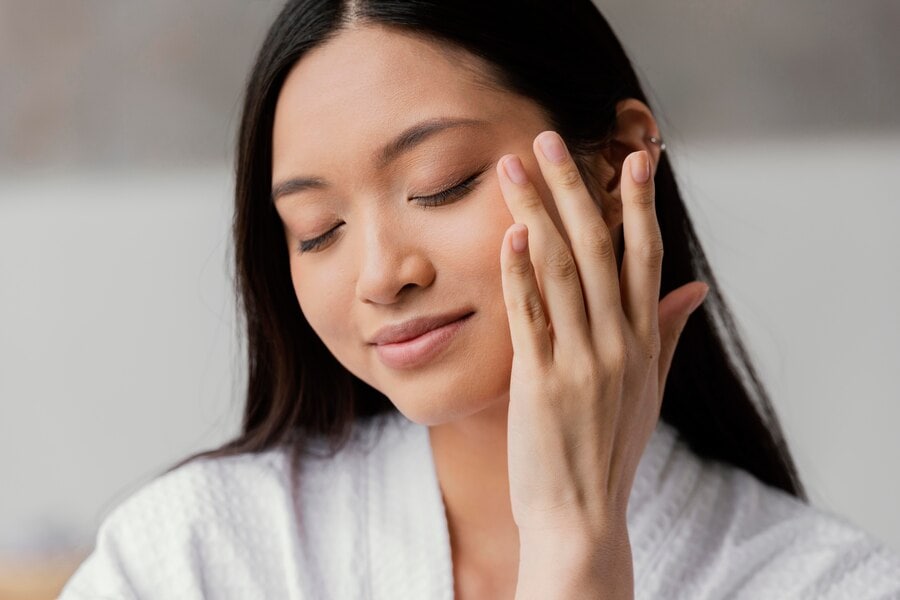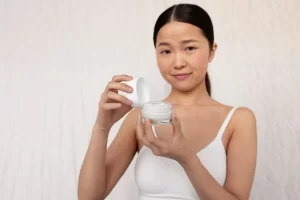
Essential Guide to Asian Skin Care Routines
Did you know that Asian skin care practices have been revered for centuries for their ability to achieve flawless and youthful complexions?
Asian beauty tips and secrets have gained tremendous popularity worldwide due to their unique approach in addressing Asian skin concerns.
In this comprehensive guide, we will delve into the world of Asian skin care routines, uncovering the secrets behind their success and highlighting their effectiveness in addressing specific Asian skin concerns and maintaining a healthy glow.
Key Takeaways:
- Asian skin care routines have a long-standing reputation for their ability to achieve flawless and youthful complexions.
- Asian beauty tips and secrets have gained worldwide popularity for their unique approach in addressing specific Asian skin concerns.
- This guide will provide insights into the secrets behind Asian skin care routines, offering expert advice and recommendations tailored for Asian skin.
- Understanding and catering to the specific needs of Asian skin can lead to a healthier and more radiant complexion.
- By exploring the world of Asian skin care, you can uncover new techniques and products that may revolutionize your own skin care routine.
Understanding Asian Skin: Concerns and Tips
Asian skincare is renowned for its effectiveness and focus on maintaining healthy and youthful skin.
Asian individuals often face unique concerns due to their specific skin types and environmental factors.
In this section, we will explore these common concerns and provide valuable tips for addressing them.
Common Asian Skin Concerns
Asian individuals commonly encounter specific skincare concerns that may differ from those of other skin types. These concerns include:
- Hyperpigmentation
- Acne and acne scarring
- Sensitivity and irritation
- Oily and combination skin
- Uneven skin tone
To effectively address these concerns and achieve optimal skin health, it is important to understand the unique requirements of Asian skin and choose skincare products specifically formulated for its needs.
The Power of Asian Skincare Products
Asian skincare products have gained immense popularity worldwide due to their effectiveness and innovative formulations.
They are carefully curated to provide targeted solutions for Asian skin concerns.
Asian skincare brands often utilize traditional ingredients such as rice, green tea, and ginseng, known for their rejuvenating properties.
These products typically focus on hydration, brightening, and improving skin elasticity, helping individuals maintain a youthful and radiant complexion.
Korean skincare, in particular, has gained a substantial following for its extensive multi-step routines and emphasis on hydration.
Its rigorous approach, encompassing cleansing, toning, treating, moisturizing, and protecting, has become a staple for many Asian skincare enthusiasts.
Creating a Skincare Routine for Asian Skin
When building a skincare routine for Asian skin, it is crucial to consider the specific needs and concerns mentioned earlier.
Here are some key tips to keep in mind:
- Double cleansing: Start with an oil-based cleanser to remove makeup and dirt, followed by a gentle water-based cleanser.
- Exfoliation: Incorporate gentle exfoliation to remove dead skin cells and promote cell turnover.
- Hydration: Use hydrating toners, essences, and serums to improve skin’s moisture levels and strengthen the skin barrier.
- Treatment: Incorporate targeted treatments such as serums or ampoules to address specific concerns like hyperpigmentation or acne.
- Moisturization: Choose lightweight moisturizers that provide ample hydration without causing greasiness.
- Sun protection: Apply a broad-spectrum sunscreen with a high SPF to protect the skin from harmful UV rays.
Remember to be consistent with your skincare routine and observe how your skin responds to different products. It is essential to listen to your skin and make adjustments accordingly.
By understanding Asian skin concerns and embracing the power of Asian skincare products, you can achieve a radiant and healthy complexion that reflects your unique beauty.
Invest in products tailored to your skin’s needs, and enjoy the transformative benefits they offer.
Common Asian Skin Concerns |
Suggested Skincare Solutions |
|---|---|
| Hyperpigmentation | Brightening serums, vitamin C derivatives, and targeted spot treatments |
| Acne and acne scarring | Gentle cleansers, exfoliants, and soothing ingredients like tea tree oil or centella asiatica |
| Sensitivity and irritation | Hypoallergenic products with soothing ingredients like chamomile or aloe vera |
| Oily and combination skin | Oil-free moisturizers, salicylic acid-based cleansers, and mattifying primers |
| Uneven skin tone | Brightening masks, chemical exfoliants, and niacinamide-based products |
Unlocking the Secrets of Asian Skin Care
Understanding the unique characteristics of Asian skin is essential for developing an effective skincare routine.
Asian skin encompasses a wide range of tones, types, and undertones, each requiring specific attention and care.
By exploring the intricacies of Asian skin and debunking common misconceptions, we can unlock the secrets to radiant and youthful-looking skin.
Asian Skin Tones
Asian skin tones vary from fair to deep, with undertones ranging from warm to cool.
It is crucial to determine your skin tone to select the right products and shades that complement your complexion. Here is a breakdown of the major Asian skin tones:
| Tone | Description |
|---|---|
| Fair | Lightest skin tone with pink or yellow undertones |
| Medium | Medium skin tone with olive or golden undertones |
| Olive | Medium to tan skin tone with greenish or yellow undertones |
| Deep | Darkest skin tone with warm or cool undertones |
Understanding your skin tone enables you to choose the right foundation, concealer, and color cosmetics that enhance your natural beauty.
Asian Skin Types
Asian skin types can be broadly categorized into four main types: dry, oily, combination, and sensitive.
It is crucial to identify your skin type to select suitable skincare products that address your specific concerns.
Here is an overview of the common Asian skin types:
- Dry Skin: Lacks moisture and can feel tight or flaky.
- Oily Skin: Produces excess sebum, leading to a shiny complexion and potential breakouts.
- Combination Skin: Exhibits both dry and oily areas, with oiliness commonly found in the T-zone (forehead, nose, and chin) and dryness in other areas.
- Sensitive Skin: Prone to irritation, redness, and easily reacts to certain ingredients or environmental factors.
Identifying your skin type allows you to select products tailored to your specific needs, promoting a balanced and healthy complexion.
Asian Skin Undertones
Understanding your skin’s undertones is crucial for choosing the right makeup shades and determining what colors complement your complexion.
Asian skin can have either warm, cool, or neutral undertones. Here are some characteristics of each undertone:
Warm Undertones: Golden or yellowish hue; best suited for shades with warm tones like peach, coral, or gold.
Cool Undertones: Pinkish or bluish hue; complemented by shades with cool tones like lavender, rose, or silver.
Neutral Undertones: A mix of warm and cool undertones; can pull off both warm and cool shades effortlessly.
Knowing your undertone helps you choose the most flattering makeup colors and enhances your natural beauty.
Asian Skin Aging
Asian skin has unique aging characteristics compared to other ethnic groups.
While Asian skin tends to show fewer wrinkles and fine lines due to increased collagen and thicker dermis, it is more prone to hyperpigmentation, melasma, and uneven skin tone.
Additionally, Asian skin may experience slower cell turnover, leading to dullness and loss of radiance.
Protecting Asian skin from harmful UV rays and maintaining a consistent skincare routine that includes hydrating, brightening, and anti-aging products can help slow down the aging process and improve overall skin health.
By understanding the nuances of Asian skin tones, types, undertones, and aging process, you can tailor your skincare routine to address specific concerns and achieve healthy, vibrant, and youthful-looking skin.

Conclusion: Essential Guide to Asian Skin Care Routines
Throughout this article, we have explored the fascinating world of Asian skincare routines and unearthed the secrets behind the timeless beauty of Asian skin.
Asian skincare goes beyond beauty trends; it is a holistic approach that considers the unique needs of Asian skin.
One of the defining characteristics of Asian skin is its natural resilience against aging. The genetic makeup of Asian skin, along with diligent skincare practices, helps maintain a youthful appearance for longer.
The emphasis on prevention and protection in Asian skincare routines plays a crucial role in reducing the visible signs of aging.
When comparing Asian skincare to Western skincare practices, we can appreciate their contrasting approaches.
While Western skincare often focuses on treating specific concerns, Asian skincare prioritizes maintenance, prevention, and a long-term approach to skincare.
This emphasis on a consistent and well-rounded skincare routine allows for a holistic approach to preserving the health and beauty of Asian skin.
FAQ
What are some common concerns faced by Asian skin?
Asian skin is prone to concerns such as hyperpigmentation, acne, and sensitivity. It is important to address these concerns with the right skincare products and routines.
What are the best skincare products for Asian skin?
Asian skincare products often prioritize hydration, brightening, and sun protection. Look for ingredients like hyaluronic acid, niacinamide, and SPF when choosing skincare for Asian skin.
Are Korean skincare products suitable for Asian skin?
Yes, Korean skincare has gained popularity among Asians due to its emphasis on gentle yet effective ingredients and multi-step routines that cater to specific skin concerns.
What are Asian skin tones and undertones?
Asian skin tones can range from fair to medium to deep, with various undertones like yellow, neutral, or olive. Understanding your skin’s undertone is important when selecting makeup and skincare products.
How does Asian skin age?
Asian skin tends to age at a slower rate compared to other ethnicities. It is known for its resilience, higher collagen levels, and decreased susceptibility to fine lines and wrinkles.
Are Asian skincare routines different from Western skincare?
Asian skincare routines often involve multiple steps, layering lightweight products for optimal hydration and nourishment. Western skincare tends to focus more on fewer, potent products.
Why is Asian skin considered resistant to aging?
Asian skin’s natural resilience, ample collagen production, and culturally ingrained skincare practices contribute to its reputation for aging gracefully and maintaining a youthful appearance.
Should Asian skin use sunscreen?
Yes, Asian skin is prone to hyperpigmentation, which can worsen without proper sun protection. Wearing sunscreen daily is crucial to prevent sun damage and maintain skin health.
How do Asian women maintain clear and youthful-looking skin?
Asian women often prioritize hydration, a balanced diet, and a diligent skincare routine. This, combined with cultural beauty secrets and community skincare knowledge, helps maintain clear and youthful skin.
What should I consider when choosing a foundation for Asian skin?
When selecting a foundation for Asian skin, consider undertones, texture preferences, and coverage needs. Asian skin often benefits from foundations with yellow or neutral undertones.
Related: Skin Types and Recommended Brands





